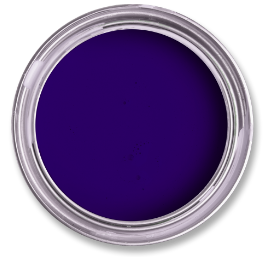In 2021 there is a new .UK domain name registered every five seconds, and in order to stand out from the crowd, it’s vital to find a strong, memorable, and eye-catching name for your brand. The name you choose will not only reflect your company, but your services, products and audience too.
At The UK Domain, we decided to take a deep dive into the names of the top 100 companies in the world to find out exactly what makes them tick. We analysed name types, revenue figures and brand value to discover what kind of name will make your company successful.
The types of brand names we studied included:
Emotive – A name that encourages the audience to create emotional connotations to your brand.
Descriptive – Brand names that describe the services or product which the company sells.
Geographical – A company named after a location or place.
Compound – A name constructed by combining two existing words to create a new word.
Acronym – Names consisting of initials.
Invented – Brand names that are original and are not in the dictionary.
Founder – A brand named after the founder.
Read on to find out exactly what you should consider to create a company name that will resonate with audiences and last through the ages.
Businesses with emotive names drive the most revenue
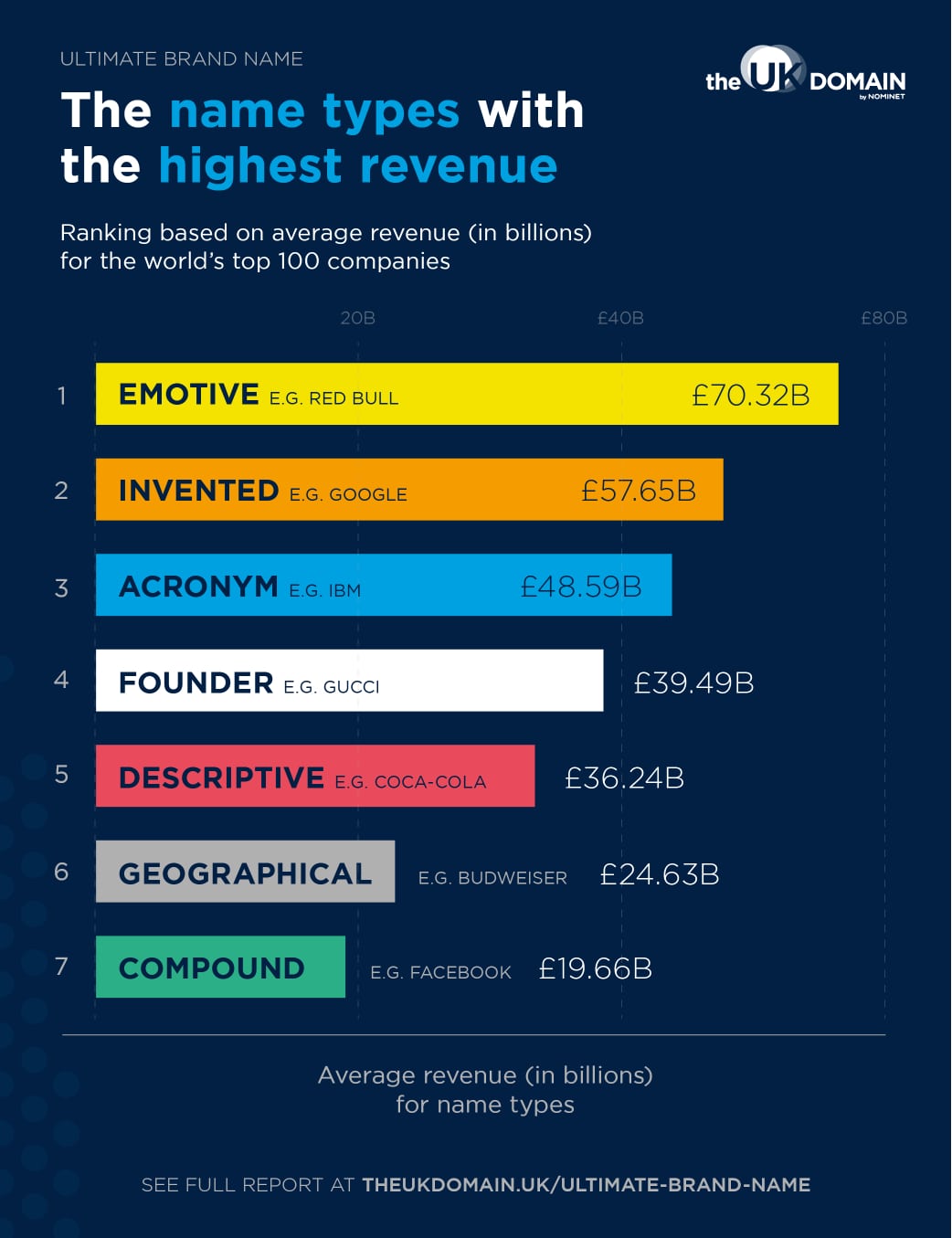
Although there are numerous ways of driving revenue through your domain, our study concluded that businesses with an emotive brand name drove the most revenue. Why is this? It could be because emotive brand names such as Apple and Amazon connect with the audience and encourage them to create emotional connotations.
- Using Amazon as an example, Jeff Bezos established the name because it is the largest river on Earth, and he was intending to build the world’s largest bookstore.
- As for tech giant Apple, Steve Jobs stated that he chose the name whilst on a fruitarian diet and thought the name sounded “fun, spirited and not intimidating”.
- Whereas NIKE derived its name from a more fantastical source. Named after the Greek goddess of victory, NIKE represents success, achievements and victory.
Ultimately, these emotive brand names are able to connect with their audience and create a reaction, by making them feel or think a certain way. If considering an emotive name for your brand, remember to research beforehand what the word symbolises and represents, because you won’t want to name your brand after something with negative connotations.
Businesses named with acronyms have the least brand value
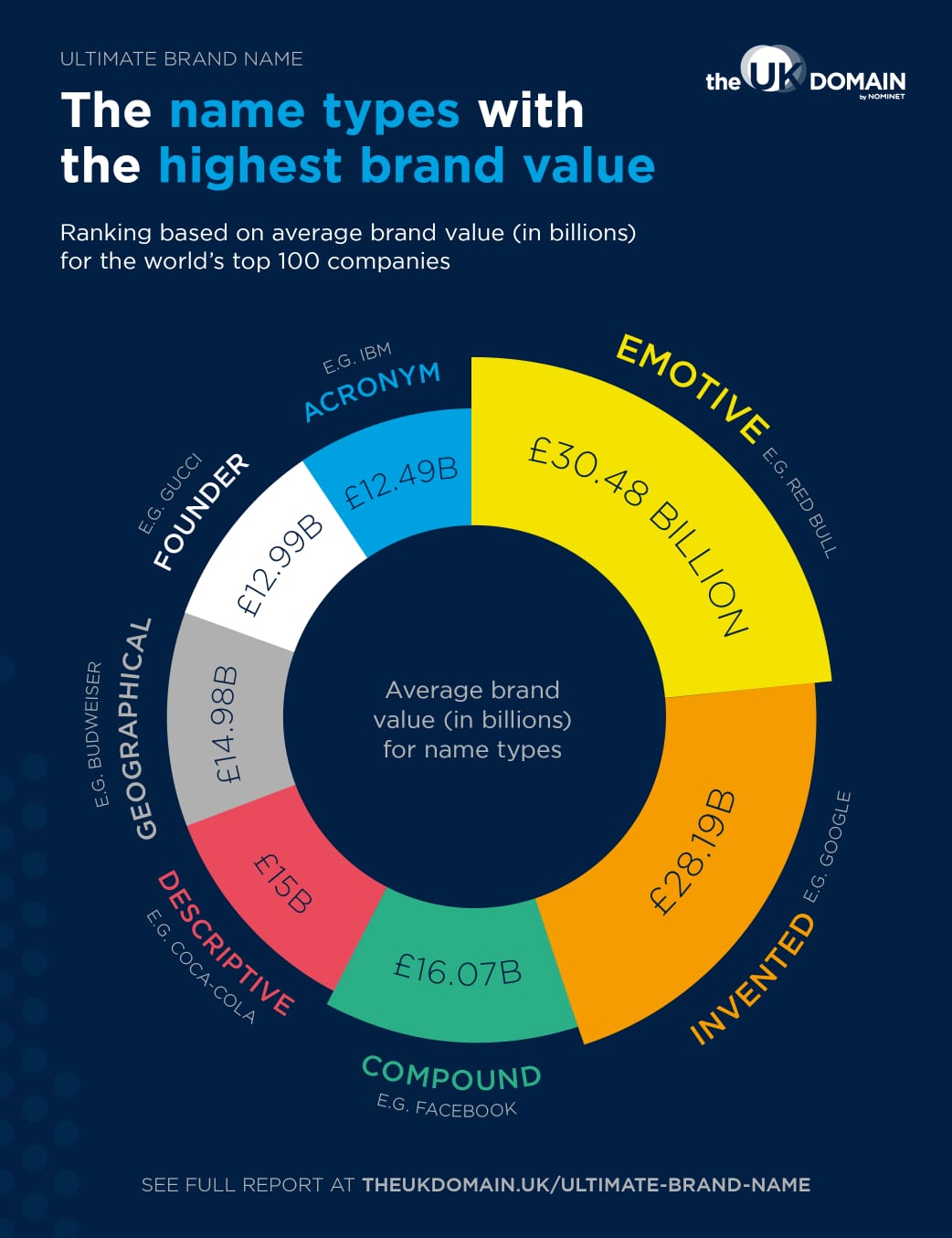
The study discovered that brands with acronyms as names have the least amount of brand value. One of the most important parts of building your business is the ability to create brand value and loyalty.
Acronyms are best used for brands that are already well established and well known, because there is less need to describe the company’s products or services. For example BMW is already well known internationally as one of the world’s leading car manufacturers and similarly KFC needs no introduction.
Commonly, brands with acronyms as names are shortened versions of a founder’s name, or named after the heritage of a long standing brand. IKEA for example, the popular Swedish furniture brand, is named after the initials of its founder Ingvar Kamprad Elmtaryd Agunnaryd, which arguably doesn’t roll off the tongue.
Brands that predate 1950 often use founders names
Before the introduction of the internet, brands commonly opted to adopt the name of their founder to represent the business. An example of a founder name could be the entertainment conglomerate Disney, named after the American entrepreneur Walt Disney.
However, after the dominance of the world wide web, aspiring business people understood the demand for creating digital personalities for their brand. Therefore, it became less popular to name brands after founders with a couple of considerations to be made:
- A founder’s name has increasingly become more difficult to secure as a domain and social media handles, as many have already been acquired by others.
- It has also become more common for people to change roles within a company, or step down to pursue other opportunities. You don’t want to name your brand after someone who works somewhere else.
- It’s also important to remember that we now live in a society where news travels fast. So before naming your business after a founder, bare in mind that any untoward behaviour that could be picked up in the press may subsequently damage the reputation of your company.
Successful new businesses use emotive and invented names to stand out
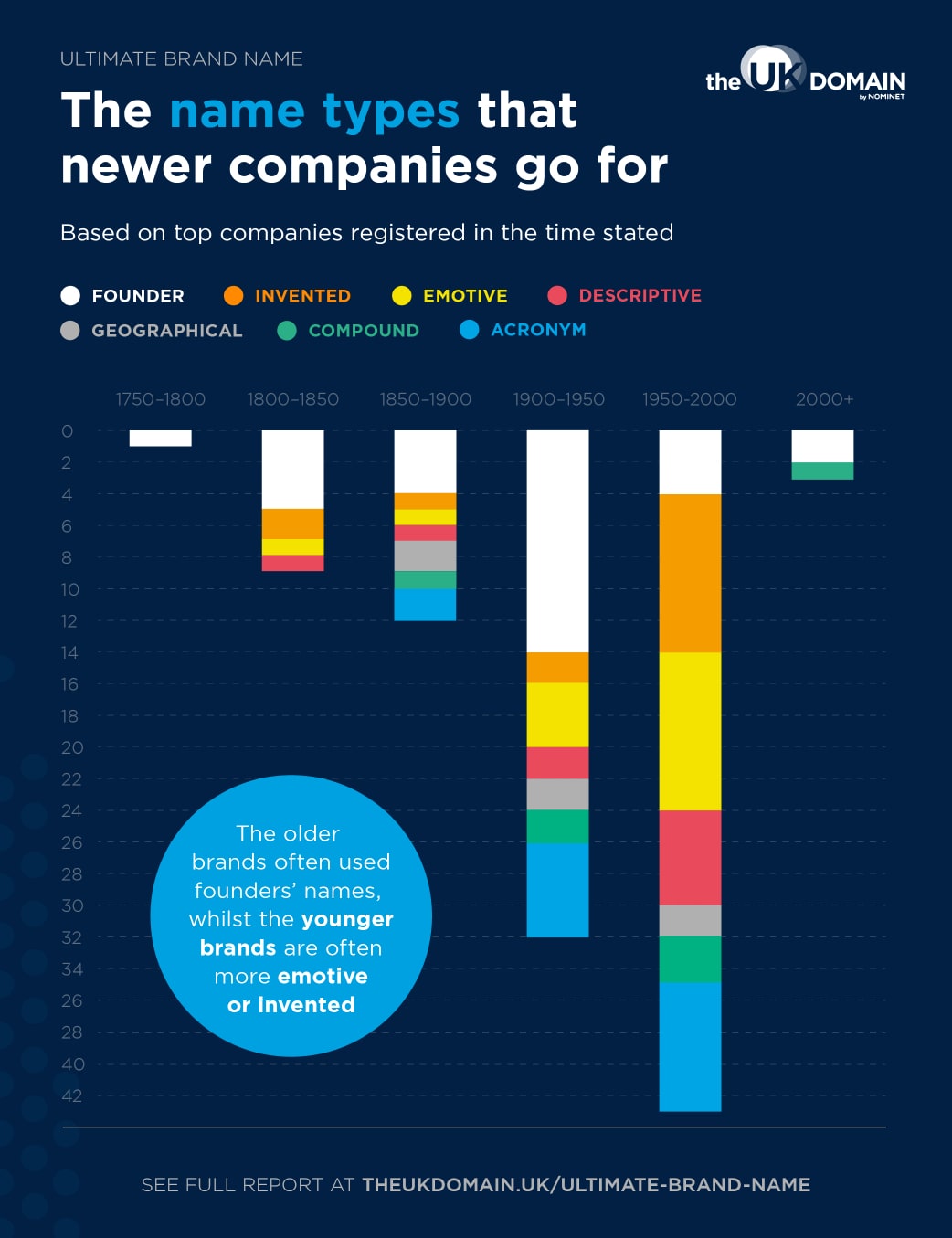
The study also discovered that in order to successfully stand out, a business name should be either emotive or invented. In the list of the top 100 brands, those created in the past 70 years have mainly used these types of names, and often bring in the most revenue.
Invented names are one of the most popular, it seems a challenge for new businesses is to find unique names in an already saturated market due to globalisation. No matter where you live, you’re likely to come up against a company with a similar name unless you create it from scratch. The benefits of having an invented brand name is that generally you will have access to domains that have not already been registered.
Brands that have already successfully created invented names include Google, Starbucks and Nintendo. All well known internationally, it could be argued that the success of their brands came from having such unique and memorable names.
One of the key components to starting a business is being able to stand out from the crowd, and this can be done by choosing a memorable domain name.
Brands with seven letters are the most popular
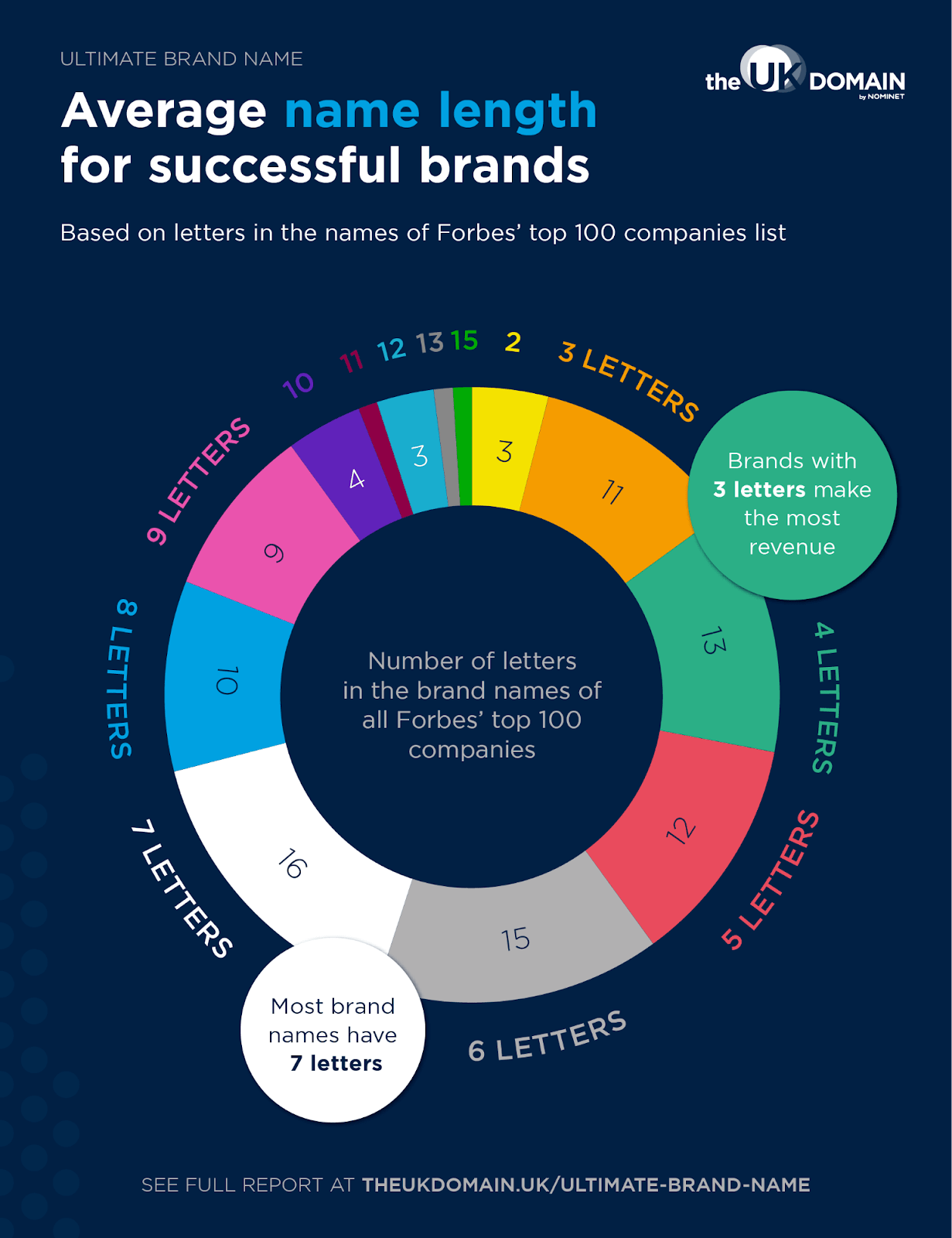
Interestingly, the study discovered that most of the brands researched have seven letters. Not too short and not too long. This could be because longer brand names could have complications with the public trying to spell and remember more letters, whilst on the other hand, keeping it short and sweet is the easiest way to guarantee your audience effortless access.
However, on average businesses with three letters generated the most revenue and those with six had the most brand value. Why is this? Again, keeping your brand name simple could allow your audience to easily access your website and view your products or services. This could give you the upper hand on your competition.
Tech companies currently dominate the most valued brands
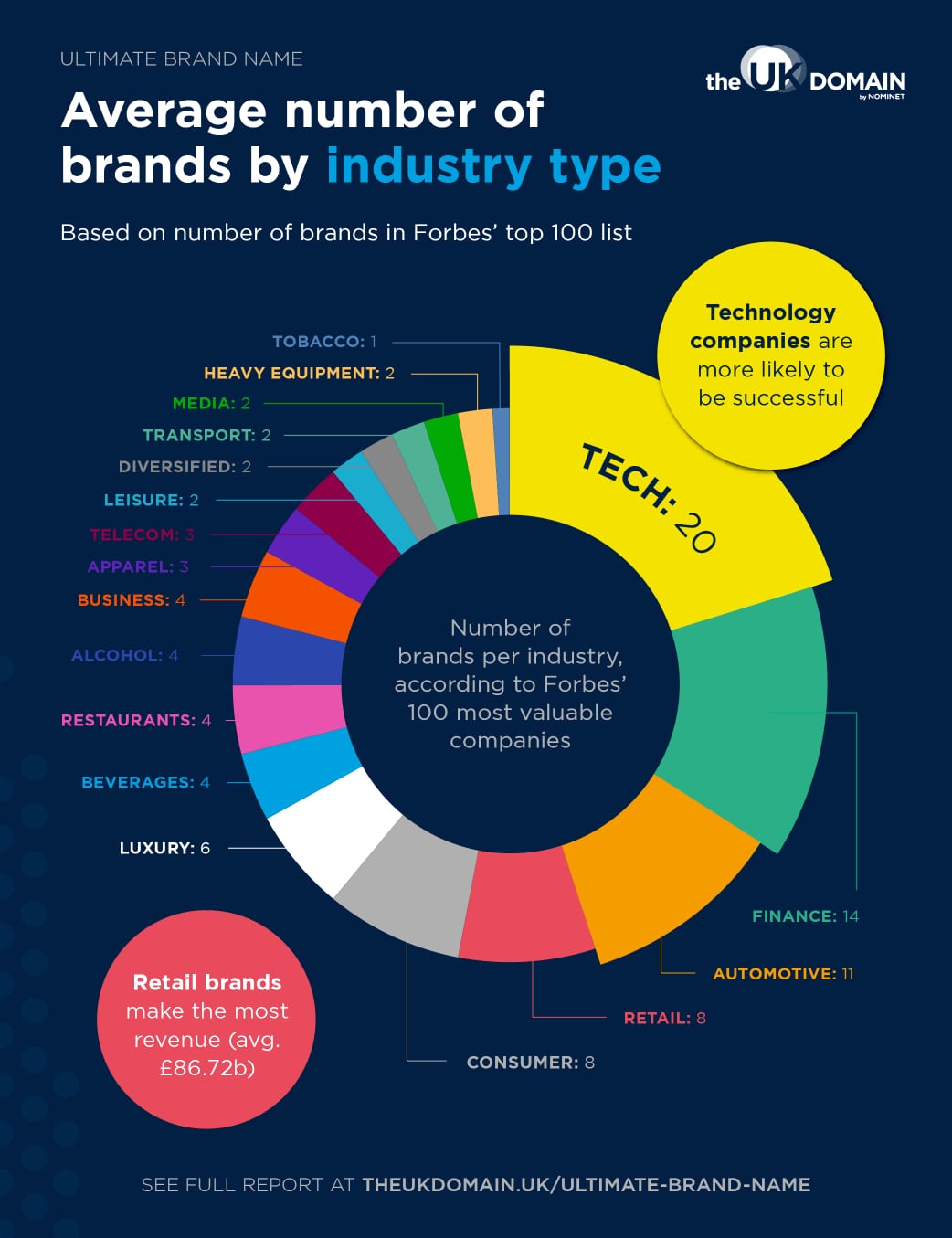
Of all the companies on the Forbes list of most valuable brands, the industry that appears the most throughout is tech businesses with a fifth of the share. Technology brands are currently booming with the likes of Apple, Google and Facebook all at the top of the list with the most brand value.
Retail brands count for 8% of the brands in the list although make the most revenue with an average of £86.72billion. IKEA, Zara and H&M are all companies with huge revenue figures although their brand value may not match.
Top tips to pick the perfect business name
To summarise, when choosing your perfect brand name, it’s important to remember the following:
- Find a name that will stand out, something that is memorable, eye catching and unique. A unique name will make it more likely to be available online.
- Find a name that will best represent your company. The best way to do this is to create a brainstorm of all the things you want your audience to think about your business.
- After you’ve shortlisted a few names, it’s important to find out what potential customers think about them. What you may recognise to be a strong brand name, others may not.
- The name you choose will be typed and said a lot, make sure it’s easy to say and spell.
- While you’re considering different name options, check to see which domains are available.
So what does the study conclude? The ultimate brand name should be, between 6-7 letters long, be invented or emotive, and suit the values of your brand.
Think you’ve found that perfect brand name?
Check our domain tool to find out if the business name you want is available online. Remember if it’s made up, you’re more likely to be able to register it! Check to see if it’s available now.
Find a domain
Methodology
The UK Domain used a seed list of the most valuable brands from Forbes and then associated a name type to each brand name.

